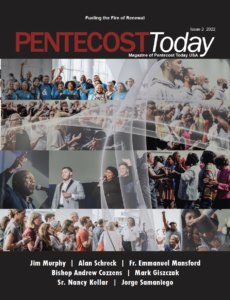Meditation and Questions for Reflection or Group Discussion
Mass Readings:
1st Reading: Jeremiah 20:7-9
Responsorial: Psalm 63:2-6, 8-9
2nd Reading: Romans 12:1-2
Gospel: Matthew 16:21-27
The Importance of Reasoning in Faith or Thinking as God Does
You are thinking . . . (Matthew 16:23)
Poor Peter! He had just confessed that Jesus was the “Messiah, the Son of the living God,” and Jesus had just congratulated him for his keen insight (Matthew 16:16). Surely Peter was elated. But just moments later, Jesus is rebuking him in the harshest terms for trying to keep him from the cross. “Get behind me, Satan,” he says. “You are thinking not as God does, but as human beings do” (16:23). Can you imagine how frustrated Peter must have felt?
What caused Jesus to change his tone so quickly? On both occasions, Peter had only good intentions. On both occasions, he was trying to do the right thing. What happened?
This story tells us that our minds can be influenced by God one moment and by the devil in the very next moment, and we may not be able to tell the difference. It tells us that we need to learn how to reason in faith, or how to think “as God does,” if we want to see our spiritual lives grow (Matthew 16:23).
Peter probably reflected on these two events. He must have asked, “Why did Jesus commend me here but rebuke me there?” He must have asked Jesus to help him. Over time, he learned more and more about the way God thinks. Over time, he became more able to understand God’s mind and to live a life that reflected God’s plan. How else could he have become one of the wisest and most devoted members of the early Church?
Here is a good way to sharpen your ability to reason in faith. Every day, take one situation and ask, “Jesus, what would you do here?” This simple little prayer can open the door to God’s grace and change the way you think. Scripture promises that you can “be transformed by the renewal of your mind” (Romans 12:2). With time, patience, and practice, you can come to discern what is “good and pleasing and perfect” in every situation (12:2).
“Lord, enlighten my mind. Teach me how to think as you think.”
Download this reflection with discussion questions here.
(Many thanks to The Word Among Us for allowing us to use meditations from their monthly devotional magazine. Used with permission. For more information on how to subscribe to their devotional magazine, go to www.wau.org).
Sunday, September 3, 2017
Questions for Reflection or Discussion:
- The first reading begins with Jeremiah crying out and complaining to the Lord over the “derision and reproach” brought upon him for speaking out and prophesying the fall of Jerusalem and Judah, because of all the evils the rulers and the people have committed. The first reading ends with these words of Jeremiah: “I say to myself, I will not mention him, I will speak in his name no more. But then it becomes like fire burning in my heart, imprisoned in my bones; I grow weary holding it in, I cannot endure it.”
- Why do you think Jeremiah was so in tune with the Lord that he cannot hold back from speaking his word to his people even though it often brings him “derision and reproach”?
- What about you? What are the obstacles that can keep you from talking to someone about your faith in Christ?
- What steps can you take to help you overcome these obstacles?
- The responsorial psalm opens by with the psalmist describing his soul “thirsting” for God. The psalmist goes on to describe some of the reasons for this thirst: “for your kindness is a greater good than life,” “You are my help,” and “your right hand upholds me.” He also describes his response to how the Lord has satisfied his thirst: “Thus will I bless you while I live; lifting up my hands, I will call upon your name,” “with exultant lips my mouth shall praise you,” and “in the shadow of your wings I shout for joy.”
- How would you describe your own soul’s “thirsting” for the Lord? What are the reasons for your thirst?
- What is your response when the Lord waters your soul and satisfies its thirst?
- In the second reading, St. Paul speaks of offering our bodies “as a living sacrifice, holy and pleasing to God.”
- What do you think Paul means by these words?
- How do you think these words apply specifically to you?
- What can you do to make them a greater reality in your life?
- Paul goes on in the letter to the Romans to urge us not to be conformed to “to this age but be transformed by the renewal of your mind, that you may discern what is the will of God, what is good and pleasing and perfect.”
- What do you think Paul means by these words?
- How would you describe what has the biggest influence on your mind? Is it television, newspapers, movies, what others think and say — or is it Scripture? What specifically can you do to reduce the influence of the first four and increase the influence of Scriptures, and the work of the Holy Spirit, in renewing your mind?
- In the Gospel reading, Jesus speaks some hard words to his disciples about his passion, death, and resurrection. He then had to rebuke Peter, because Peter wanted to prevent Jesus from doing what he needed to do.
- Why do you think Peter responded the way he did?
- How can you be more open to Jesus’ leadings in your life, rather than telling him what he needs to do for you?
- Jesus also goes on to speak these words: “Whoever wishes to come after me must deny himself, take up his cross, and follow me. For whoever wishes to save his life will lose it, but whoever loses his life for my sake will find it.”
- What message do you think Jesus was trying to convey with these words?
- What cross is the Lord asking you to bear? How can the support of other Christians help in bearing this cross?
- The meditation is a reflection on Jesus’ rebuke of Peter in the Gospel and it describes the importance of learning how to “reason in faith, or how to think ‘as God does,’ if we want to see our spiritual lives grow.” It ends with these words: “Here is a good way to sharpen your ability to reason in faith. Every day, take one situation and ask, ‘Jesus, what would you do here?’ This simple little prayer can open the door to God’s grace and change the way you think. Scripture promises that you can ‘be transformed by the renewal of your mind’ (Romans 12:2). With time, patience, and practice, you can come to discern what is ‘good and pleasing and perfect’ in every situation (12:2).”
- How would you describe what it means to “reason in faith, or how to think ‘as God does’”?
- Before making a major decision, what impact do you think first praying and asking: “Jesus, what would you do here” would have on your making the right decision?
- Take some time now to pray and ask the Lord for the grace to grow in your ability reason in faith and think as he does? Use the prayer below from the end of the meditation as the starting point.
“Lord, enlighten my mind. Teach me how to think as you think.”
[The discussion questions were created by Maurice Blumberg, who is in partner relations for The Word Among Us Partners, (http://www.waupartners.org/); a ministry of The Word Among Us (www.wau.org) to the military, prisoners, women with crisis pregnancies or who have had abortions, and college students. He is also a member of the National Service Committee Council of the Catholic Charismatic Renewal (https://www.nsc-chariscenter.org/) and a member of the board of directors of the Christlife Catholic Ministry for Evangelization (https://christlife.org/). Maurice was also the founding Executive Director of the National Fellowship of Catholic Men. He can be contacted at (Enable Javascript to see the email address) mblumberg@wau.org or mblumberg@aol.com.]


 Click Here for us to pray for your intentions through our new website.
Click Here for us to pray for your intentions through our new website. 
